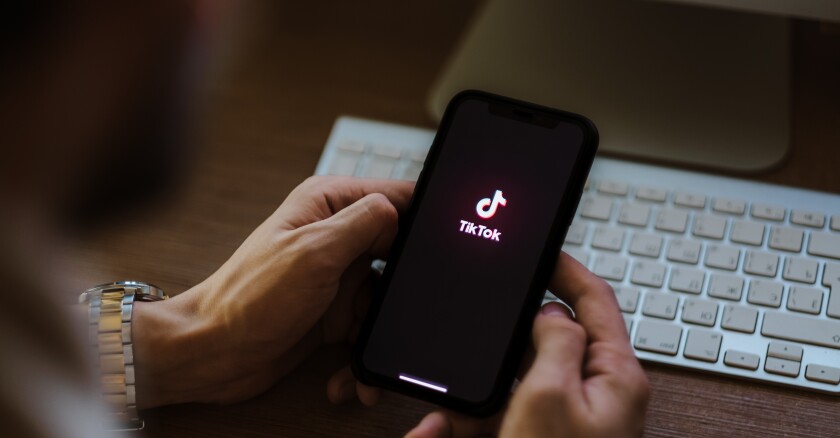Where next for the most popular app in the world? President Biden signed a bill that could lead to a nationwide TikTok ban, but will it actually happen? What are the implications?
April 28, 2024 •

Adobe Stock/nikkimeel
According to several sources, TikTok was the most popular app in the world in 2023 with 672 million downloads. Other sources report that “TikTok had 150 million monthly active users in the U.S. in February 2023, an increase from 100 million reported in August 2020.”
“President Joe Biden signed a bill Wednesday that could lead to a nationwide TikTok ban, escalating a massive threat to the company’s U.S. operations.
“On Wednesday morning, President Biden signed into law a national security bill that would force TikTok to be sold by its owner, ByteDance, or face a possible ban in the United States.
“Minutes later, TikTok CEO Shou Zi Chew responded with a video posted to the platform, declaring that ‘rest assured, we aren’t going anywhere.’
“’Make no mistake, this is a ban, a ban on TikTok and a ban on you and your voice,’ Chew says in the video. ‘Politicians may say otherwise. But don’t get confused.’”
“The constitutional law here appears straightforward: Congress can’t outright ban TikTok or any social media platform unless it can prove that it poses legitimate and serious privacy and national security concerns that can’t be addressed by any other means. The bar for such a justification is necessarily very high in order to protect Americans’ First Amendment rights, Krishnan said.
“Lawmakers argue that the bill under consideration isn’t actually a total ban. Rather, it would enact a new authority to ban apps in ‘narrowly defined situations’ when they are controlled by a foreign adversary, New Jersey Rep. Frank Pallone, the ranking Democrat on the Energy and Commerce Committee, said before the committee in March. He compared the bill to historical efforts to prevent foreign ownership of U.S. airwaves due to national security concerns.”
NPR: President Biden signs law to ban TikTok nationwide unless it is sold
“Still, the law is not expected to cause any immediate disruption to TikTok, as a forthcoming legal challenge, and various hurdles to selling the app, will most likely cause months of delay.
“The measure was tucked into a bill providing foreign aid for Israel, Ukraine and Taiwan. The law stipulates that ByteDance must sell its stake in TikTok in 12 months under the threat of being shut down.”
A BIT MORE BACKGROUND
“The ruling, which came on Thursday, means that Montana’s TikTok ban, which was set to go into effect on Jan. 1, has now been temporarily halted.
“U.S. District Judge Donald Molloy said Montana’s TikTok ban ‘oversteps state power’ and ‘likely violates the First Amendment.’
“Molloy wrote that though officials in Montana have defended the law as an attempt to protect consumers in the state, there is ‘little doubt that Montana’s legislature and Attorney General were more interested in targeting China’s ostensible role in TikTok than with protecting Montana consumers,’ the judge wrote.”
“’SB 419 explicitly bans TikTok because of its direct connection to a specific foreign nation,’ Molloy wrote. ‘At best, the State’s comparison is weak. At worst, it is reflective of the pervasive undertone of anti-Chinese sentiment that permeates the State’s case and the instant legislation.’
“He said the state had also failed to provide evidence to support its alleged interest of consumer protection, that the state does not have an important government interest in regulating foreign affairs and had not shown the consumer protection interest for the bill, and thus, the plaintiffs would be likely to succeed in their argument.”
Essentially, the judge said this was a federal issue, while at the same time bringing up constitutional issues of free speech.
ByteDance, the parent company of TikTok, has already promised to challenge this ruling in the federal court, and these legal challenges will take months, or possibly even years, to resolve. Therefore, the timing of any ban will likely be in 2025 or later.
FINAL THOUGHTS
It is rare for federal legislation to receive such wide bipartisan support. However, it clear that large majorities in both parties see TikTok as a serious threat to U.S. national security. Whether an agreement can be reached to sell TikTok (or part of TikTok) to a U.S. company remains to be seen.
But taking a big step back, the full reaction to these efforts from the younger generation could still become a major factor in what eventually happens to this TikTok ban. I am writing this piece as protests around the country surge regarding the Israel–Palestine conflict. There are also numerous other global tensions, and this law is included in the legislation that provides defense funding for Israel and Ukraine.
If a TikTok ban does happen, it will also be after the November election. The dynamics of this issue could also change if the administration changes.
Bottom line, watch this space, because never before has such a popular social media app been so front and center regarding international relations, with implications for cybersecurity, privacy, free speech, data protections, influence during an election and much more.

Daniel J. Lohrmann is an internationally recognized cybersecurity leader, technologist, keynote speaker and author.
*** This is a Security Bloggers Network syndicated blog from Lohrmann on Cybersecurity authored by Lohrmann on Cybersecurity. Read the original post at: https://www.govtech.com/blogs/lohrmann-on-cybersecurity/what-would-a-tiktok-ban-mean
